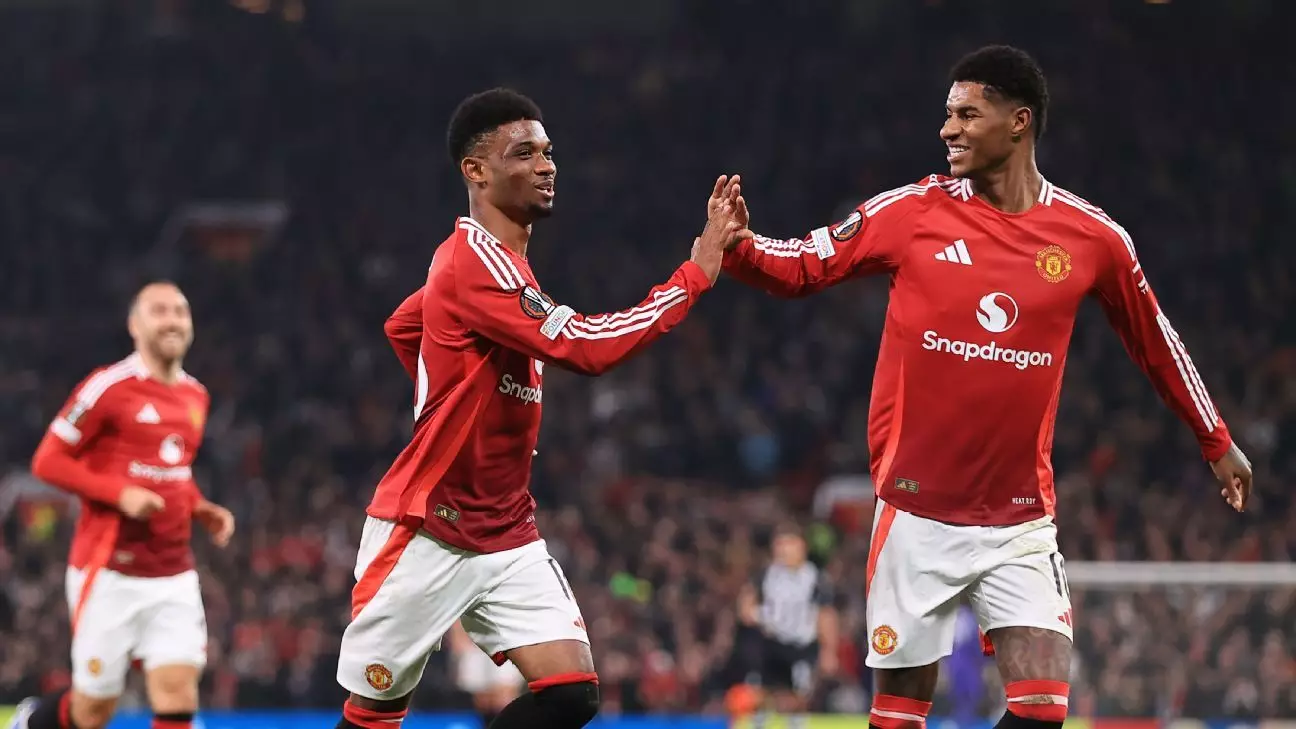The transition of managers within a high-profile football club like Manchester United always stirs both excitement and anxiety among players and fans alike. Recently, the announcement of Ruben Amorim taking over as the new head coach of Manchester United has brought both a sense of renewal and apprehension. Amad Diallo, a promising 22-year-old winger, has much to gain from this managerial shift, as the prior administration under Erik ten Hag often overlooked his potential. With the recent Europa League victory against PAOK FC, Diallo seized a golden opportunity to showcase his talents, illustrating both the fragility and potential of his burgeoning career.
In a crucial Europa League match that marked a turning point for United’s European campaign, Diallo transformed the narrative surrounding his struggling tenure at Old Trafford. Following a period of limited game time and inconsistent selection, he was entrusted with a starting position by caretaker manager Ruud van Nistelrooy. Diallo rewarded this faith by netting both goals in a 2-0 victory, demonstrating his ability to perform under pressure. His opening goal, a precise header, showcased his aerial prowess, while his second, a stunning curler from outside the box, highlighted his technical skill.
Diallo’s performance was especially noteworthy given the backdrop of uncertainty regarding his future under a new coach. It indicated not only his readiness to contribute but also his potential value within a revamped squad. His ability to convert a match-winning display could not only bolster his confidence but also provide him with a solid foundation upon which to impress Amorim once he officially takes the reins.
Amad’s journey under Ten Hag was characterized by inconsistency. Despite a memorable FA Cup moment against Liverpool, where he delivered a late winner, he struggled to establish himself as a regular starter. Even when he was given chances, such as an impactful assist against Southampton, they were fleeting, leaving him at the mercy of Ten Hag’s selection whims. This inconsistency might have left him at a crossroads, potentially questioning his position within the squad.
Reacting positively to his limited opportunities, Diallo exhibited a dedicated work ethic, often staying behind after training for additional practice—something emphasized by Van Nistelrooy. This relentless pursuit of improvement is not only commendable but essential in a competitive environment like Manchester United, where young talents frequently battle experienced incumbents for playing time.
While the thrill of a standout performance can momentarily uplift a player’s prospects, the future remains uncertain. As Amorim prepares to implement his tactical vision, it becomes essential for players like Amad Diallo to adapt their styles accordingly. Amorim’s preferred 3-4-3 formation poses challenges for a traditional winger, a role that may not fit into his tactical framework. The emphasis on narrow forwards and wing-backs requiring defensive responsibilities could reposition Diallo in ways he has yet to experience.
This fundamental transformation raises questions around his fit within the system. Will he adapt to the demands of a more defensively minded role, or will he need to carve out a new identity within the team? The upcoming days will reveal much about his versatility and willingness to embrace change, which are crucial for long-term success at the club.
Diallo is not the only player facing uncertainty as Amorim steps into his role. Senior players, including Bruno Fernandes and Marcus Rashford, are also left speculating about their roles in this new tactical setup. Those accustomed to having defined positions now face a transition that could significantly reassign their contributions on the pitch.
Moreover, the coaching staff dynamics will shift, and all eyes will be on Van Nistelrooy as well. With his temporary management proving fruitful with two wins from three matches, his future role is still in limbo. Joking about checking his phone for updates signifies the unpredictability those involved in the club face during this period of transition.
As Manchester United embarks on this new chapter with Amorim at the helm, players like Amad Diallo can only hope that their recent performances resonate positively within the new structure. The club stands at a crossroads—eager to rediscover its storied glory while navigating the challenges of player integration and tactical cohesion. Amidst this atmosphere of change, Diallo’s recent success will serve as a litmus test for his career moving forward, as he will need to adapt, prove his worth, and importantly, embrace the uncertainties that lie ahead. In the world of football, one day can change everything, and Diallo’s journey with United is just beginning.
